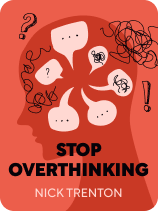

This article is an excerpt from the Shortform book guide to "Stop Overthinking" by Nick Trenton. Shortform has the world's best summaries and analyses of books you should be reading.
Like this article? Sign up for a free trial here.
Are you burdened by stress? How do you healthily manage stress and anxiety?
When you feel stressed, you can take a constructive approach to it and calm yourself through constructive and grounding practices. In Stop Overthinking, Nick Trenton outlines several ways to approach stress by gaining a sense of control over yourself and the situation.
Let’s look at how managing stress and anxiety can be done with these constructive and grounding approaches.
Constructive Approaches to Stress
Instead of letting your anxious thoughts take over, try practicing four stress approaches to regain a sense of control:
Avoid the situation. Cut out unnecessary people or situations that cause you stress. For instance, if driving on the highway in heavy traffic makes you feel uncomfortable, try taking a local route or using public transportation as a way of managing stress and anxiety in your routine.
Change the situation. When you can’t avoid a stressful situation, consider what you can change to reduce the stress. For example, if you’re struggling to concentrate on your work because of a construction project outside your building, purchase noise-canceling headphones. Also, people around you often aren’t aware of what’s bothering you about a situation. To change it, you often must speak out and express your needs and limitations. For example, if a friend needs to rant but you have a project due at the end of the day, respectfully communicate that you can’t hear them out right now.
Make peace with the situation. Sometimes, there’s nothing you can do to make a stressful situation better. Instead of worrying endlessly, acknowledge your feelings and make peace with the situation. For example, if your relative is in the hospital and you’re worried about their condition, acknowledge and accept that you feel concerned and understand there’s nothing you can do to alter the situation right now.
Adapt to the situation. Ease the stress of a challenging situation by changing your expectations. For example, if you’re frustrated because a project didn’t turn out the way you envisioned, reduce your stress by practicing forgiveness toward yourself and identifying what you learned from the experience.
A Step-By-Step Approach to Managing Immediate Stress
In The Chimp Paradox, Steve Peters explains that your stress response gets triggered faster than your rational mind can process the situation, which can make it difficult to cope with a stressful situation calmly and productively. He provides a step-by-step guide on how to calm your stress response in the moment so that you can better approach the situation. This guide includes some aspects of Trenton’s above approaches.
- First, acknowledge your feelings. As Trenton advises, accepting rather than suppressing your emotions is an important part of most stress management approaches.
- Next, consciously commit to changing your reaction to something else. Similar to Trenton’s advice of changing your expectations to adapt to a stressful situation, deliberately deciding on another reaction helps you take control and ease the stress of the situation.
- Then, pause before you react. Like Trenton’s advice of avoiding stressors, Peters recommends you try to remove yourself from the situation.
- Look at the situation from a long-term perspective. This might be a helpful way to make peace with a stressful situation as Trenton recommends.
- Think about what actions you can take to solve the issue. Like the technique Trenton suggested, look for ways to change the situation.
- Finally, Peters advises you try to exit the situation on a positive note, such as smiling to yourself or someone you were interacting with.
Grounding Practices for Stress
You’ve learned the four approaches to managing stress, but what if you still feel anxiety bubbling up? Trenton suggests you distract yourself from racing thoughts by engaging your five senses. This keeps your brain occupied and grounded in the present moment so that you don’t drift into overthinking. To ground yourself with your five senses:
- Look at five things in your surroundings. For example, look at the sky and observe the texture of the clouds or how fast they’re drifting.
- Touch four things around you. Run your fingers across your desk or stroke your pet.
- Listen for three sounds. Pay attention to the sound of your breath or the hum of your air conditioner.
- Try to detect two smells. Observe the scent of your coffee or your clothes.
- Tune into one thing you can taste. You might notice the lingering taste of your breakfast.
(Shortform note: This method that Trenton proposes, also known as the 5-4-3-2-1 technique, is a common grounding technique to combat panic and disrupt your fight-or-flight response. In addition to using your five senses when practicing this technique, you can also consider focusing on one positive thing about yourself, like a good deed that you’re proud of. This technique has benefits beyond relieving anxiety—it improves your quality of life by encouraging a habit of appreciating the present moment.)

———End of Preview———
Like what you just read? Read the rest of the world's best book summary and analysis of Nick Trenton's "Stop Overthinking" at Shortform.
Here's what you'll find in our full Stop Overthinking summary:
- What overthinking is and how it’s connected to stress and anxiety
- Ways you can manage stress before, during, and after it happens
- How to conquer your habit of overthinking with long-term solutions







This article offers some practical advice on managing stress and anxiety, but I’d love to see more about how to implement these techniques in daily life. Could you provide some real-world examples?